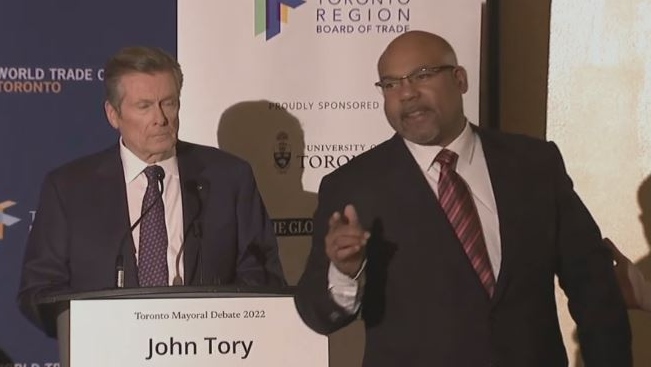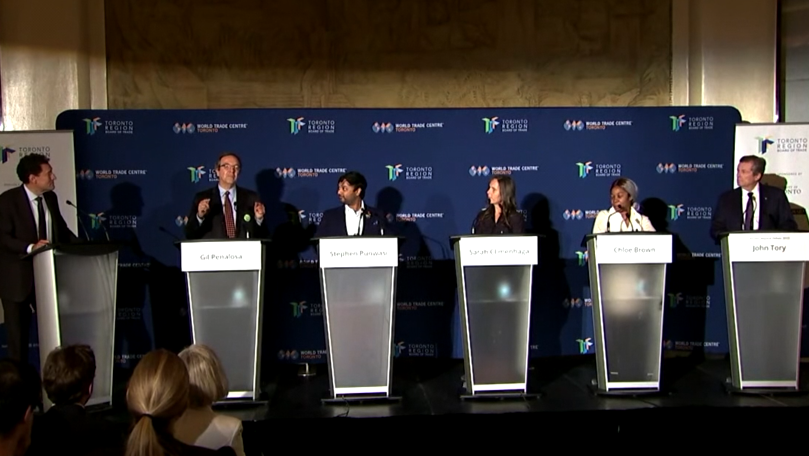Toronto mayoral candidates clash over transit, affordable housing in final debate ahead of election day
Five of Toronto’s mayoral candidates went head-to-head Monday afternoon at a final debate ahead of next week’s municipal election.
The candidates were asked to address housing, small businesses, red tape, and revenue during the 90-minute event hosted by the Toronto Region Board of Trade.
The mayoral hopefuls participating included incumbent John Tory, Gil Penalosa, Chloe Brown, Sarah Climenhaga and Stephen Punwasi.
For Tory, the debate offered another opportunity for him to talk about what he has accomplished over the past eight years as mayor. Every time one of his opponents questioned a decision he made or made a comment about how progress at city hall has been too slow, Tory jumped in with a statistic or a stump speech about his record.
But the incumbent also had to navigate a number of unplanned interruptions during the course of the event. Twice someone from the crowd yelled over him as he was trying to answer a question from the moderator, and in one instance, the heckler walked up to the stage and stood within an arm’s distance of Tory.
“When you’re the incumbent, you know, as they say on the radio, the hits just keep on coming,” he told reporters after the debate.
“It was a good exchange of ideas. I had a great chance to get my platform out.”
For the most part, the debate was rather civil. Few candidates talked over each other and, in some cases, hands were raised.
Penalosa touted his “fast lane” transit plan while also saying he would re-evaluate how the city spends money so that it isn’t “wasted” on the Gardiner Expressway or on horses for the police service.
Brown zeroed in on ways to modernize city hall and eliminate unnecessary bureaucracy while Climenhaga made it clear that residents would be highly consulted on how city hall is run if she were elected.
Punwasi appeared inexperienced on stage next to the four other candidates, often throwing questions to his opponents and coming to abrupt conclusions in his statements.
Here’s a recap of some of the debate’s key moments:
2:20 p.m.
The first topic at the debate is affordable transit. The candidates were given about a minute for opening statements.
Penalosa spoke about his plan to create fast bus lanes while Tory reiterated his accomplishments from the last eight years, while promising to continue to invest in building transit to “actually get it done.”
“For the first time ever in the history of our city, we have three governments agreeing on a transit plan,” Tory said. “It’s not the time to change the plan.”
Punwasi, meanwhile, said Toronto has a “terrible, terrible transit system” and focused on how we can better fund the TTC, including building shopping malls and housing on city-owned land.
Brown meanwhile, placed the blame for lack of leadership at city hall. She spoke about deteriorating infrastructure and the need for improved service.
Climenhaga spoke about ending mandatory transit fares, although didn’t go into detail about how it would be funded.
2:40 p.m.
The five candidates then sparred on affordable housing. Tory found himself defending his five-point plan to increase supply and build high-rise apartments with affordable units on transit corridors. The other four candidates took this opportunity to target his record and say that not enough shovels were in the ground.
Climenhaga said that residents and developers should both be in the room when decisions are made so that concerns can be addressed while Brown questioned multiple candidates about their plans, saying that it isn’t the fault of the development industry there is so much red tape.
The candidates hardly touched the moderator’s question – which was particularly about dealing with bylaws that prevent modest increases in density.
3 p.m.
Tory was interrupted during the third segment of the debate about how to make things easier for the business community. Reginald Tull, a mayoral candidate not participating in the debate, started heckling him from the crowd before making his way to the stage. He stood directly beside Tory and asked him to address homelessness and affordable living while the moderator told him interruptions weren’t allowed “unless they were witty and [his comments] were not.”
Tull was escorted out of the room.

The conversation quickly pivoted to quality of living and ensuring people who work in Toronto also live in Toronto. Penalosa brought up the “Alberta is calling” campaign and asked why our workforce was rapidly leaving the city.
Brown focused on bureaucracy and how the city shouldn’t be outsourcing technological developments.
“There is this wall of corporate bureaucracy that is slowing us all down from getting actual work done.”
Climenhaga spoke about vaccine mandates and how it could be affecting workforce retention.
3:10 p.m.
Another heckler interrupts Tory to ask why only five candidates are participating in the debate.
There are 31 mayoral candidates on the ballot. The Toronto Region Board of Trade chose five to take part in the 90-minute event.
The candidates then went head-to-head on red tape. Everyone agreed the city needs to make it easier for residents to deal with government. Tory said that steps have been taken to modernize but the government needs “to be nimble” and that’s why he is going to appoint a “red tape champion” whose job will be to identify those challenges and come up with solutions.
Climenhaga suggested that removing unnecessary bylaws could help streamline processes while Brown said that corporate processes are putting up barriers. Every sector should be modernized.
“Your experience is collecting dust and that’s why we have the red tape that we have,” Brown said.
3:20 p.m.
The final section of the debate is about revenue. The city is expected, at this moment in time, to run a $850 million deficit. Penalosa says that Toronto should be given a part of the provincial surplus that exists and should stop “irresponsible spending.”
Tory took one last chance to defend his record and reiterate that he would keep property taxes below inflation. The budget will be balanced thanks to “prudent financial management,” revenue from the TTC and partnerships with other governments.

Climenhaga focused on consultation and how residents need to have more say in how the city spends its money while Brown says politicians need to know how policy making works in order to spend the money wisely.
3:30 p.m.
The debate ended without any closing remarks.
Voting turnout
The turnout for advance voting dropped 30 per cent compared to 2014 and seven per cent from 2018 despite adding three more days for voters to cast ballots early.
“It’s discouraging, and not a good sign for civic engagement,” John Beebe, founder of the Democratic Engagement Exchange at Toronto Metropolitan University, told CTV News Toronto.
“I don’t think we’re seeing an inspiring campaign here but people need to remember this is our chance to get out and participate and see how they can affect the next four years,” Beebe said.
Nelson Wiseman, a political science professor emeritus at the University of Toronto, said signs of disinterest in the mayoral election could be rooted in the fact that the race is not a competitive one.
“A lot of people might be happy with the status quo so they can’t be bothered voting or they think not much is going to change,” Wiseman said.
Speaking with reporters following the debate, Penalosa said that it’s imperative that we get “young people” to the polls.
“We need the youth to get involved. Many youth complain…we need the young people to vote,” he said.
Brown, who is a millennial, said that while politicians like to talk about how the younger generations don’t get out and vote because they may not care, she stresses “that’s not true.”
“We’re working two or three jobs to prop up micromanagers like John Tory and his policies and that is where it becomes so important for all of us to take this opportunity to bring your friends, family, their friends and families, to the polls.”
Election day is just a week away on Oct. 24. Polls will be open from 10 a.m. to 8 p.m.
CTVNews.ca Top Stories

'Embarrassed': NDP MP calls on Randy Boissonnault to resign over false Indigenous claims
A Métis member of Parliament is calling on the employment minister to resign over what he calls harmful false claims to Indigenous ancestry.
Calgary doctor charged with sexual assault of multiple patients
A Calgary doctor is facing charges after allegedly sexually assaulting four patients.
Trump chooses TV doctor Mehmet Oz to lead Centers for Medicare and Medicaid Services
President-elect Donald Trump on Tuesday tapped Dr. Mehmet Oz, a former television talk show host and heart surgeon, to head the agency that oversees health insurance programs for millions of older, poor and disabled Americans.
'I'm just tickled pink': Two childhood friends from New Brunswick named Rhodes Scholars
Two young women from New Brunswick have won one of the most prestigious and sought-after academic honours in the world.
Swiftie's friendship bracelet beads confiscated at Calgary airport
A Canadian Taylor Swift fan has some 'Bad Blood' with the Calgary International Airport after security staff confiscated hundreds of dollars worth of beads she was going to use to make friendship bracelets.
An emotional Rafael Nadal retires at the Davis Cup after he loses and Spain is eliminated
Rafael Nadal lost to Botic van de Zandschulp of the Netherlands in the Davis Cup quarterfinals in the last match of the 22-time Grand Slam champion's career.
Anonymous male celebrity files extortion lawsuit against attorney representing Sean 'Diddy' Combs accusers
An anonymous male celebrity says he is the victim of an extortion scheme and is suing a high-powered Texas attorney who is representing several people in civil lawsuits that accuse Sean “Diddy” Combs of sexual assault.
Ukraine now has long-range missiles and Russia rewrote its nuclear policy. Are we on the verge of atomic warfare?
The four-year-old document has a bland, bureaucratic title — 'Basic Principles of State Policy on Nuclear Deterrence' — but its contents are chilling, especially with its newest revisions.
SpaceX launches giant Starship rocket, but passes up catching it with mechanical arms
SpaceX on Tuesday launched another Starship rocket, but passed up catching the booster with giant mechanical arms.
































